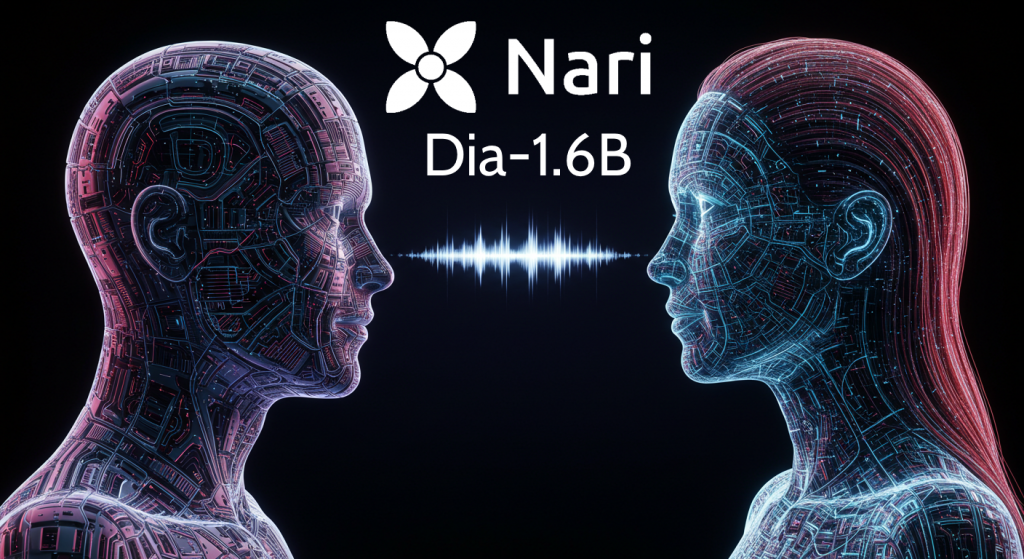Dia by Nari Labs: Redefining Natural AI Voices with Open-Source Power

Have you ever listened to an AI voice and thought, “That just doesn’t sound natural”? For too long, synthesized speech has struggled to capture the subtle nuances of human conversation. But Nari Labs is changing the game with Dia, a groundbreaking open-source Text-to-Speech (TTS) model designed to generate remarkably realistic, multi-speaker dialogue. Dia doesn’t just read words; it understands context and expresses emotions, bringing an unprecedented level of human-like nuance to AI-generated speech.
What Makes Dia So Special?
Dia stands out in the crowded TTS landscape thanks to several innovative features that push the boundaries of what AI voices can achieve:
- Multi-Speaker Dialogue: Imagine an AI that can generate authentic conversations between multiple distinct voices, seamlessly capturing the natural back-and-forth of human interaction. Dia delivers precisely this, making it ideal for dynamic audio content.
- Non-Verbal Sounds for True Expression: A truly human voice isn’t just about words. Dia incorporates non-verbal cues like laughter, coughing, and even throat-clearing, adding a layer of expressiveness often missing in synthesized speech. Simply add tags like
(laughs)or(coughs)in your script, and Dia will generate these sounds naturally, enriching the emotional depth of the audio. - Effortless Voice Cloning: Dia empowers users to mimic a specific person’s voice with surprising accuracy. By uploading a short audio sample and including its transcript, Dia can generate new content in that unique voice, opening up exciting possibilities for personalization and content creation.
- Audio Conditioning for Fine-Tuned Control: Want to guide Dia’s output in terms of tone, emotion, or delivery style? Users can achieve this through short audio samples, offering granular control over the final result and ensuring the generated speech perfectly matches the desired mood.
- The Power of Open Source: True to the spirit of innovation, Dia’s model weights and inference code are openly available on GitHub and Hugging Face. This commitment to open source encourages community involvement, fosters transparency, and accelerates further research and development in realistic speech synthesis. As with any open-source project, it’s always a good idea to review the licensing terms for specific usage details.
Experience Dia for Yourself!
Curious to hear Dia in action? You don’t need to install anything to test its capabilities:
- Hugging Face Space Demo: Dive into the Hugging Face Space Demo to experiment with Dia directly in your browser. It’s a fantastic way to experience its realistic dialogue and non-verbal cues firsthand.
Potential Applications: Unleashing Dia’s Versatility
Dia’s ability to generate such realistic and engaging dialogue opens up a vast range of exciting possibilities across various industries:
- Content Creation: Generate draft audio for podcasts, video voiceovers, or other scripted content with distinct character voices, streamlining production workflows.
- Audiobooks: Create more engaging audiobook experiences with truly distinct character voices, bringing narratives to life in a way traditional TTS models cannot.
- Gaming & Animation: Develop expressive and dynamic dialogue for video game characters or animated features, enhancing immersion and character depth.
- Conversational AI & Media Prototyping: Rapidly prototype conversational interfaces or multimedia projects with incredibly natural-sounding speech, enabling faster iteration and more realistic user testing.
Get Started with Dia
Ready to explore the future of AI-generated audio? Here’s how you can get started with Dia:
- GitHub Repository: For developers and those who want to dive into the code, clone the repository:
git clone https://github.com/nari-labs/dia.git. You’ll find comprehensive documentation and licensing information within the repository. - Hugging Face Model Card: The Hugging Face model card for
nari-labs/Dia-1.6Bprovides detailed information about the model, including its architecture, training data, and, crucially, licensing details for commercial and non-commercial use.
Dia by Nari Labs represents a significant leap forward in the quest for more natural and versatile AI-generated audio. Its open-source nature makes it a valuable resource for the research community and is poised to stimulate further innovation in realistic speech synthesis. Remember to always check the project’s license for specific usage guidelines as you embark on your Dia journey!
Share this content:
